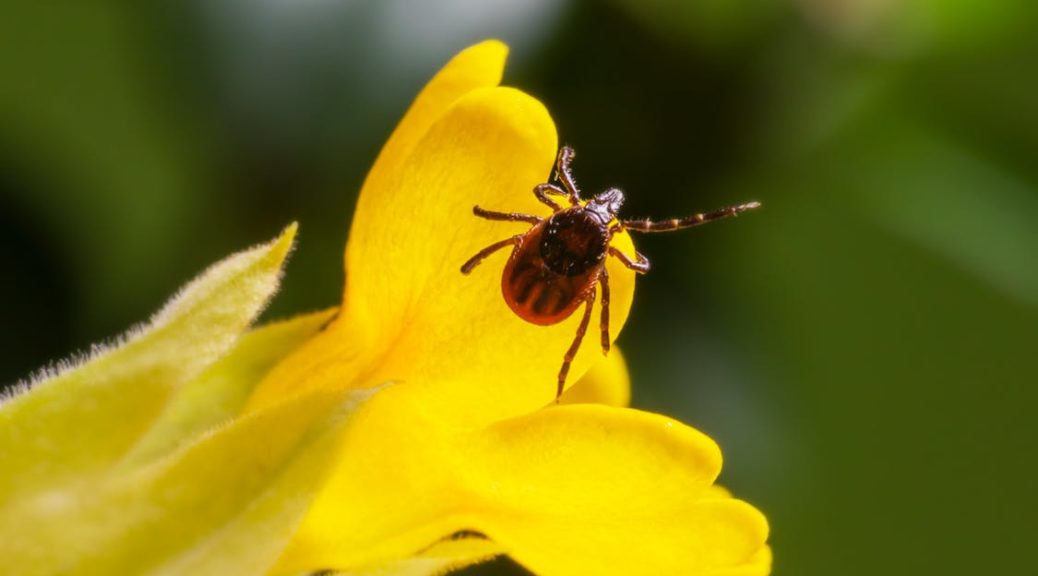What is Lyme Disease?
Lyme disease is the most common vector-borne disease in the United States. It is most common in the Northeast and mid-Atlantic regions and the upper Midwest. In Massachusetts, Lyme disease occurs throughout the state.
It is caused by bacteria that are spread by tiny, infected black-legged (otherwise known as deer) ticks. Most humans are infected through the bites of immature ticks called nymphs. Nymphs are tiny (less than 2 mm) which makes them hard to see. Adult ticks can also transmit Lyme disease bacteria, but they are larger and more likely to be noticed and removed before they have had time to transmit the bacteria. While nymphs feed during the late spring and summer months, adult ticks are most active in the early spring and fall. It is important to remember that ticks can bite anytime temperatures are above freezing!
In order for a person to get Lyme disease, the infected tick typically has to be attached to a person for at least 24 hours before it can spread the bacteria. Black-legged ticks are capable of spreading more than one type of germ in a single bite. In Massachusetts, they can also carry the germs that cause babesiosis and human granulocytic anaplasmosis.
Symptoms of early Lyme disease usually begin to appear from 3 to 30 days after being bitten by an infected tick. If untreated, late symptoms may occur from weeks to years after the initial infection. The most common early symptom is a rash where the tick was attached. It can start as a small red area that spreads outward, clearing up in the center so it looks like a bullseye or donut. The rash may clear up and then appear in other places on the body. Early symptoms also include fever, headache, stiff neck, sore and aching muscles, and joints, fatigue, and swollen glands. Even though these symptoms may go away by themselves without medical treatment, oftentimes people with Lyme disease will experience more serious problems later on.
Early treatment is extremely important for people who contract Lyme disease. If left untreated, people who become infected can develop late-stage symptoms. About 60% of people with untreated Lyme disease get arthritis in their knees, elbows, or wrists. The arthritis can move from joint to joint and is often chronic. Meningitis, facial weakness (Bell’s palsy), and weakness or pain in the hands, arms, feet, and legs. These symptoms can last for months, often shifting between mild and severe. A slowing heart rate and fainting can also be an early or late symptom.
Most patients with Lyme disease respond well to a three-to-four-week course of oral antibiotics. People with certain neurological or cardiac forms of illness may require intravenous treatment with antibiotics. Although most cases can be cured with a course of oral antibiotics, patients can sometimes have symptoms of pain, fatigue, or difficulty thinking that lasts for more than 6 months after they finish treatment. This condition is called Post-Treatment Lyme Disease Syndrome (PTLDS). Unfortunately, there is no proven treatment for PTLDS. Patients with PTLDS usually get better over time, but it can take many months to feel completely well.
If you are tired of your outside keeping you inside, give Mosquito Joe of Walpole-Waltham a call today at 508-669-0271 or request a free quote today!
 Outside is fun again.
Outside is fun again.



 Pet owners and parents alike are concerned with tick prevention because a tick bite can have serious implications for children and pets. Five of the ten diseases ticks transmit to humans can be transmitted to pets. That is why keeping everyone (furry or not) around your household bite-free is important.
Pet owners and parents alike are concerned with tick prevention because a tick bite can have serious implications for children and pets. Five of the ten diseases ticks transmit to humans can be transmitted to pets. That is why keeping everyone (furry or not) around your household bite-free is important.